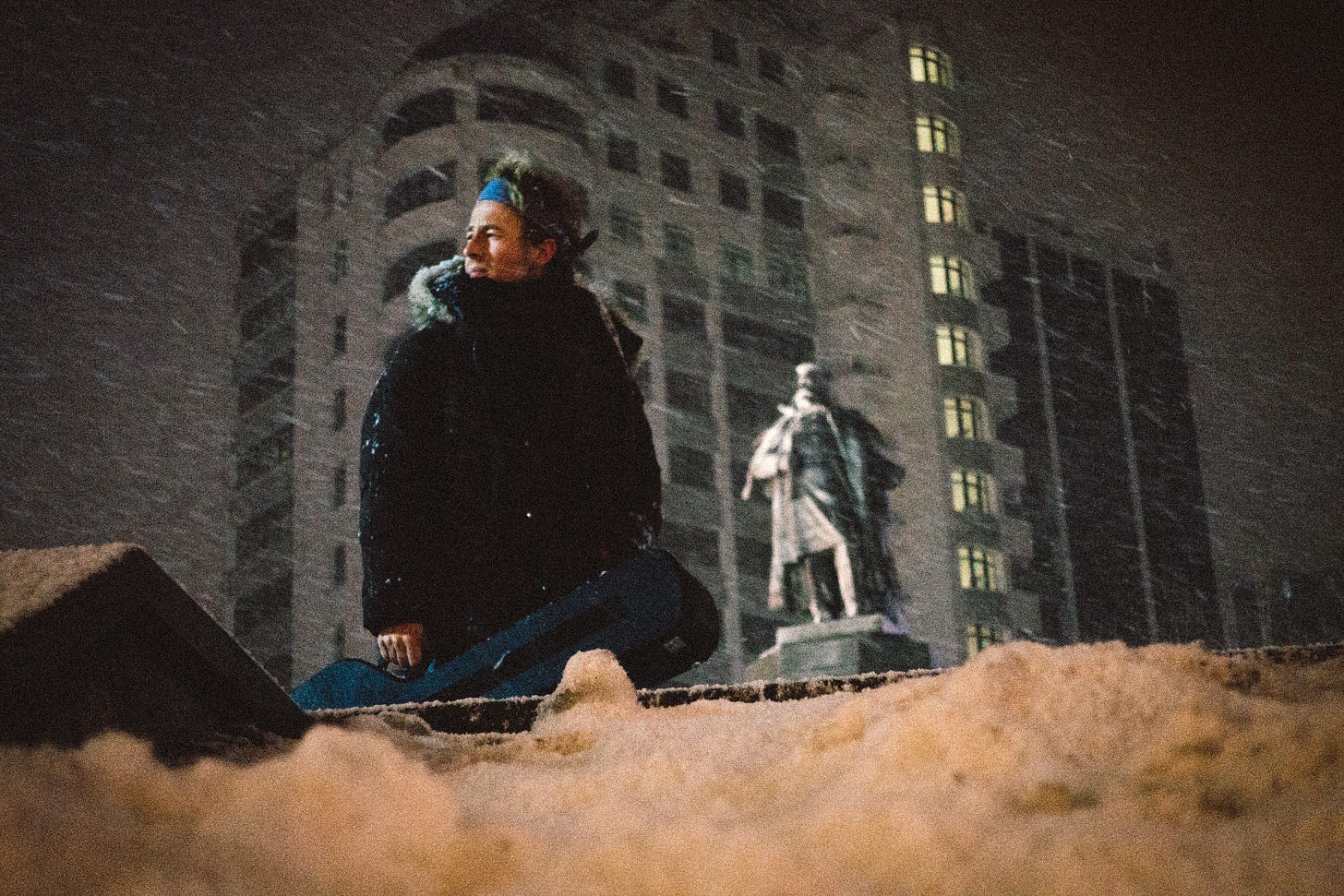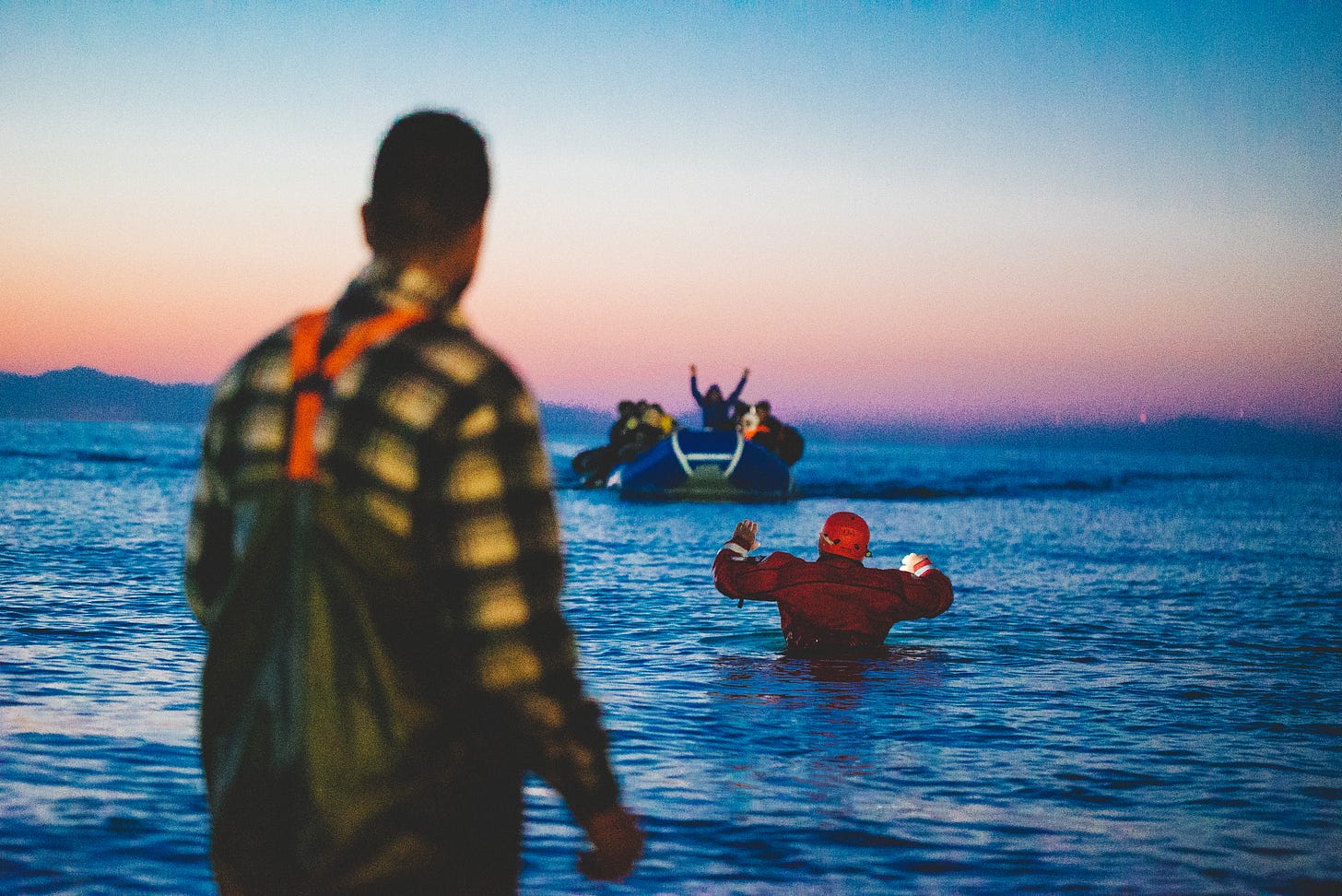The Masterplan Collapses, Now What?
Making a creative life when the original plan stops working...
Vladivostock, after 16,472 miles through Russia, 2015
Dear friends,
In the last few weeks, I’ve started posting a daily thought about creative life here on Substack Notes. I’m enjoying experiencing Substack as a community — rather than simply a portal for my newsletter.
I see it as a kind of morning meditation. And beyond that, it’s becoming a useful way to test ideas for the Saturday edition of The Creative Life.
In one Note, I reflected on how many creatives I’ve known who were most attached to their initial Masterplan ended up disillusioned — and walked away from creative life entirely.
This week, I spent two days DOP’ing a short film, edited a 10-minute version of a mini-documentary, and worked through 1,000 photos for a client.
None of this was in my masterplan.
On the one hand, I’ve carried a mini frustration — that I haven’t picked up my guitar or worked on my own projects, whether the podcast or YouTube.
But equally, I feel utterly blessed — that I get to make my living from tools I’ve had to learn simply to keep going. And more than that, that each of these has become a new blade with which to investigate creative life further.
In today’s newsletter, I want to share five stories about how blocks on the road — yes, the Obstacles we face — become the very means by which we keep going.
I hope that whatever blockade, barrier, or wall you’re facing, this might help you see it differently.
In my experience, they’re put there for a purpose. Not just to test your resolve — but to bring you perspectives you’d never encounter if you remained fixated solely on your own path.
Donna, nestled in the Italian Alps
Part 1: Lighting Strikes Twice Before You Arrive
I was in two bands throughout my 20s.
The first was in London, called Creel Commission. After it collapsed, I auditioned musicians for a new band. I was pretty extreme, and in the ad I wrote:
“Forming band. Moving to Berlin. Don’t apply unless you’re willing to give up everything.”
Yup — pretty extreme!
But useful.
Only two people showed up, and they got the job. And so, into my van we packed our lives — and off we went.
After some years, that band fell apart too.
We’d lived the path — squatted a building, played hundreds of shows in the Tacheles — and lived it.
And yet, it fell apart — and pretty awfully.
At 30, I didn’t just feel like a failure. I felt like I’d thrown away my entire 20s.
I remember — literally — being on my knees, asking anything out there for help. I’d lost my mother as a teen, hadn’t spoken to my dad in five years. There was no world to return to, and no future to go toward.
I was going through a threshold event.
It was terrifying — being lodged in a state of in-betweenness.
A kind of limbo where the whole world seemed to move forward, and yet I was completely stuck.
And yet, an angel did emerge — a 70-year-old woman who said:
“Oh Jim, the thing about you is that it will only start happening for you once you step out on your own.”
That was the one thing I’d never wanted.
I wanted the community of a band — the protection of a group, the never-say-die spirit of facing life with people on the same mission, bound together by a shared Masterplan.
Never once in my life had I dreamed of becoming a solo artist.
More than that — I felt certain I didn’t have the talent.
And yet, when life reduces you, there is a certain salvation that comes when there is nothing but the limitation itself.
Hemingway talked about it — when, strange as it seems, he missed what the war gave him.
When all that was to be done was the one thing, the only thing.
The angel’s comment triggered three realisations in me:
My journey in music had not yet begun. Everything had been a preparation.
I would feel the pain — and go again.
In feeling failure, I felt the most freeing thing: I had nothing left to lose.
If moving forward meant failing joyfully, so be it.
To be able to do it, finally, on my own terms — felt like holy freedom.
That was 2009, and I was 30 years old. Shortly after, I wrote a song called Through My Weakness.
I had been reduced — and in the rubble, I didn’t find nothingness.
I found my foundation stone.
My Masterplan had been utterly broken —
Broken so that I could find what I’d been meant to do all along.
I just hadn’t been ready for.
Part 2: A Journey That is Yours
There was nothing more freeing than encountering zero.
For the first time in my adult life, I could make my own choice.
I no longer had to make an argument for an idea, or persuade someone else about a gut instinct.
It catalysed me — and I started making the first inroads into who I’ve become all these years later.
The greatest feeling about having the courage to act when you feel you’ve failed is that you reframe reality.
You realise that failure is not an event — it is a feeling.
More importantly, I began my long journey of releasing myself from the straitjacket of failure entirely.
At times, I felt half mad — looking out across the factory skies in Berlin and, in moments of unattachment or desperation, feeling like that isolated character in Edvard Munch’s The Scream.
But with it, I felt the zeal of creation — as if, for the first time, I’d unlocked something in myself.
The songs were coming from everywhere.
I hadn’t known it, but I’d been living my whole life in a form of restriction.
It was a time of taking any gig I was offered.
Of sending CDs to any radio station.
Of printing promo and fly-posting the city.
I released two albums back to back, and Memoirs from the Afterlife became the only song to enter the German Top 20 without any label attached.
My Masterplan had collapsed — and with it, all sense of safety in the world.
I compensated in the way a manic young man does:
With the zeal of action.
Everything I’d lost triggered the necessity of becoming myself.
It all led up to a show at Lido — and the song below was the last I played as an independent artist.
I didn’t know it, but EMI were in the audience — and I got signed right after we came off stage:
Ben’s wonderfully retro double-headed guitar was lent by Gibson, who’d just come on as a sponsor...
But I’m not sure what excuses I have for the moustache though!
Part 3: The Ways We Are Broken to Become Ourselves
When I lost the deal with EMI a few years later, I felt again in a state of collapse.
I remember writing in my diary:
How many rebirths can we endure?
I’d believed that this revised version of me — this 2.0 — had arrived.
What I had no idea of was that after you lose a major label deal, you are done goods.
It didn’t matter that my album Lunatic Lullabies was only in the shops for three days before Universal bought EMI.
It didn’t matter that there was no marketing budget because EMI was broke.
It didn’t matter if the next songs I was writing were my best.
You’re just done in the eyes of the industry you’d spent your life trying to get accepted by.
I spent the next year hustling for work as a filmmaker. I worked for anyone, anywhere — for free, for lunch, for the most basic fee.
It was never my plan — but I had to make money, and it was the only thing I could do other than music.
I’d been playing with DV tapes since I could remember, and with the advent of social media, I was an early adopter of video.
I applied for a job at a company called Artist Dock, and the work started coming in in a flurry.
The strangest thing? I kept getting calls from Universal — the label that had dumped me.
Then Sony.
And my videos — still made with really basic, cheap gear — started getting millions of views, like this one for Joris.
In a world of laborious, expensive, corporatised filmmaking, my independent zeal was beginning to bear fruit.
The thing is, in Germany, stuff moves slow.
The instinct is to over-plan everything, to over-prepare, to make things safe.
That, however, clashes with reality.
Things never go according to plan. And control is all too often a fantasy.
I remember asking the boss at Sony why I got the call for the video above, and he said:
“Oh, I heard about this crazy Scottish guy who only works when there’s no plan.”
I hadn’t realised it, but by being the opposite of the culture I was living in, I had started to be seen as a commodity.
He was right.
I still hate planning. And almost exclusively, I still get the call when things are underprepared, over-budget — but with no map.
Those are easy tools for me — because in the breaking of my Masterplan, I had to learn how to get stuff made from nothing.
Part 4: Why Can’t I Make Feature Films?
As time moved forward, all that I longed for was music.
But it felt like there was no way back.
I carried on writing — but my days of recording studios were over.
Again, I felt reduced.
And all I felt I could do — was follow that reduction.
So I decided I would.
I’d start from zero.
I began recording an EP in my bedroom, on my laptop - To The River’s Edge.
It was the first time I’d recorded just guitar and voice — and I felt naked.
You can hear it just like I played it here — with the resolution plainly stated in the lyric:
I will begin again.
The next day, after recording it, I got a call from Split Music:
What about a tour of China?
Fate had arrived where everyone else had left.
The strange this is, that the day before I’d sat in my flat and thought about the tools I needed.
What do I really need to begin again?
I saw three things.
My guitar.
My camera.
And lastly, I turned and saw myself staring back at me.
I’m in, I’ll take the tour
And so, I started packing.
The tour of China was a lifeline.
It was the only lifeline to a musical world I no longer felt a part of.
I wasn’t struggling mentally like I once was — I’d overcome too much, and I’d found a fortitude I could never have known in advance.
But I did know one thing:
This was my only chance. My only option.
That’s the thing about threshold events.
Usually, the idea of retreat is just that — an idea.
You’ve been summoned by life. And all there is… is to answer the call.
I was also curious how far I could take my filmmaking.
I figured that if I could somehow eke out a documentary from the tour, maybe I could position myself in a stronger place — both artistically and financially.
And so I went to China — and roughed out a documentary.
Six years later, I completed my sixth feature-length documentary — and through that process, transformed my life.
I’d repositioned myself in the market — which meant I could charge much higher fees, and buy back my time.
Essentially, I had made a career by failing, learning, winging it, and making bold, seemingly hopeless moves.
I’ve never written about this, but I’ve never made a showreel or a website for my commercial work.
I never had to.
All the ways my Masterplans had shattered — one by one — had thrust me out, over and over, into the world.
My life had made its own neural network.
I hadn’t noticed it, but every time I hit a dead end, I’d been forced into a new channel.
Each new path led to new people.
Each lost night out ended with new contacts made.
And each time I learned a new skill, I made something — and those people noticed.
I realise now, more than ever, that life isn’t meant to make sense.
But it does have its own internal logic.
And as each Masterplan collapses, I’m always dumped back on the doorstep of my original dream.
My freelance career has given me the freedom to continue making records — like the one I’m releasing this year.
And though, in some ways, I still feel uncertainty about my musical future, I know enough about the process to trust this:
If you continue to write from the heart, and you continue to put out good work —
Something good always ends up coming about.
The question becomes the question you never expected to ask:
The Masterplan has collapsed — now what?
With love,
Jim
The final story is too close to my heart and one I have never written about in public. I share it with love for my paid subscribers.
It involves the night my life changed, but more importantly, the biggest lesson life ever taught me. I took the photo below at the end of that long, dreadful night. The man wading out is a Spanish firefighter named Paco — one of the great heroes I’ve met, and one of the men fate would thrust me into working alongside.
Keep reading with a 7-day free trial
Subscribe to The Creative Life to keep reading this post and get 7 days of free access to the full post archives.








